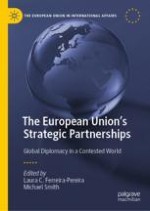2021 | OriginalPaper | Chapter
4. Soft Power in the European Union’s Strategic Partnership Diplomacy: The Erasmus Plus Programme
Authors : Laura C. Ferreira-Pereira, João Mourato Pinto
Published in: The European Union's Strategic Partnerships
Publisher: Springer International Publishing
Activate our intelligent search to find suitable subject content or patents.
Select sections of text to find matching patents with Artificial Intelligence. powered by
Select sections of text to find additional relevant content using AI-assisted search. powered by
